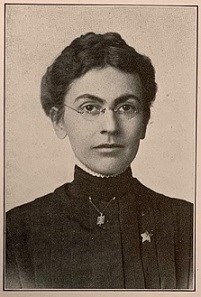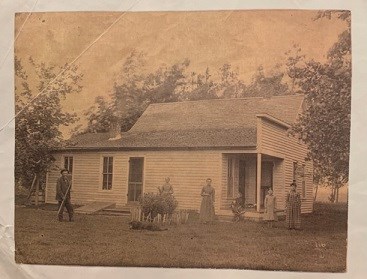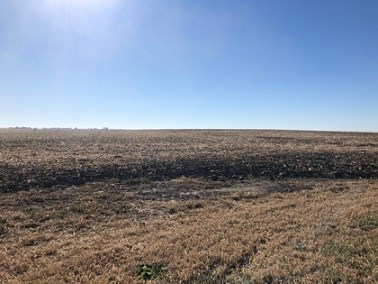Last updated: November 18, 2020
Article
The Making of Phoebe May Hopper- Pioneer to Professor

Dedication: To Our Parents
“Who, together with many other brave pioneer parents, had the courage, perseverance, faith, and idealism to lay the foundation upon which was built the great commonwealth of Nebraska.”
Lincoln, Nebraska
February 19, 19511

York County Historical Association and Nancy Beach
“When Robert Hopper was 20 years old, he enlisted in the 41st Illinois Volunteer Infantry. Hopper participated in several Civil War Battles including Vicksburg. On February 18, 1866, he married Mary Catherine Cowgill of Illinois. In 1871 they brought their family to York County.” 2

York County Historical Association and Nancy Beach
The Hopper family settled on a 160 acre claim to the northeast of York, NE. Robert Hopper filed his claim in 1871 and did not prove-up the land until 1888- seven years later. Proving-up land is a concept that came about because of the Homestead Act of 1862, which allowed individuals to settle land and keep it if they could prove they had made improvements upon it. The original dimensions of the frame house described in the Hopper manuscript was 16x16’ but was added on by the time the land was proved-up to 26x26’. 3 The homestead was about 6 miles south of Lincoln Creek. To go to Lincoln, NE for supplies, the Hoppers would have had to make a one-week trip there and back. 4


Bolton’s favorite memory of her aunt May was watching her comb her hair. “She was prim and proper about everything.” 10 As she typed the manuscript, Bolton often questioned if it would ever be able to reach publication. During our interview in York, Bolton shared how she found the story boring and wondered if anyone would care to read it. Though these were her initial thoughts, she could “dream along” and dive deeper into the text. 11 Bolton believes her aunt would be “delighted” to know students are reading about her journey to Nebraska and the perseverance of her parents. 12 Aunt May was disappointed when the manuscript was not published, but we can keep the story alive by teaching others about the Hopper family through our class.
Hi! Our names are Abbey Parten, Brooke Lindquist, and Hayley Piippo. We are freshmen at Nebraska Wesleyan University (NWU). For one of our classes, we were tasked with finding ways to share engaging information about women of the past using the unpublished manuscript of NWU 1901-1938 professor, Phoebe May Hopper. This article and The Incredible Perseverance of the Woman Pioneer- An examination of women pioneers from 1800s and 1900s York County, Nebraska, are the results of our research. We hope you enjoy our work and learn a little more about the extraordinary women pioneers that helped shape the world we know today.
[1] Phoebe May Hopper, “Little Pioneer’s Parents” (private collection of Jean Bolton, 1951), 1.
[2] The History of York County, Nebraska (Curtis Media Corp., 1988).
[3] Nancy Beach, conversation with authors (P, A, P, H), October 30, 2020
[4] Nancy Beach
[5] Hopper, 71
[6] Hopper, 71
[7] Hopper, 71
[8] Greater York Area Centennial Corporation, Greater York Area Centennial, souvenir historical booklet, 97, 1970
[9] Jean Bolton (great niece of Phoebe May Hopper) conversation with authors, October 30, 2020.
[10] Jean Bolton
[11] Jean Bolton
Beach, Nancy. Conversation with authors (P, A, P, H). Anna Palmer Museum and York County. October 30, 2020.
Bolton, Jean (great niece of Phoebe May Hopper). Conversation with authors. October 30, 2020.
Greater York Area Centennial Corporation. “Greater York Area Centennial.” Souvenir historical booklet. 1970.
The Greater York Area Genealogical Society. The History of York County, Nebraska. Curtis Media Corp., 1988.
Hopper, Phoebe May. “Little Pioneer’s Parents.” Private collection of Jean Bolton. 1951.
